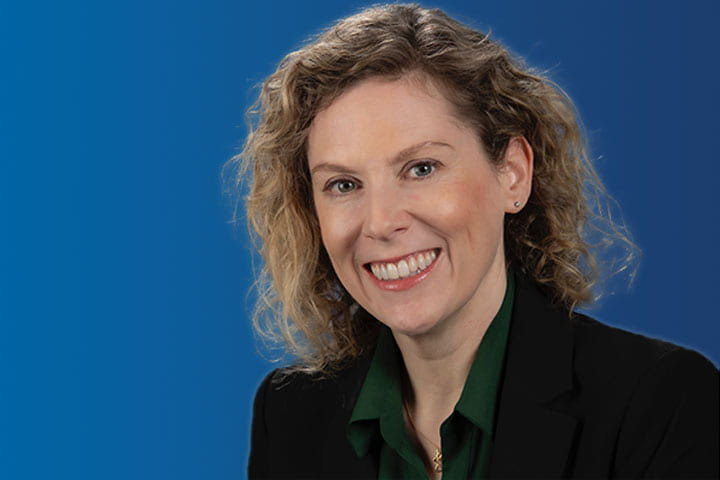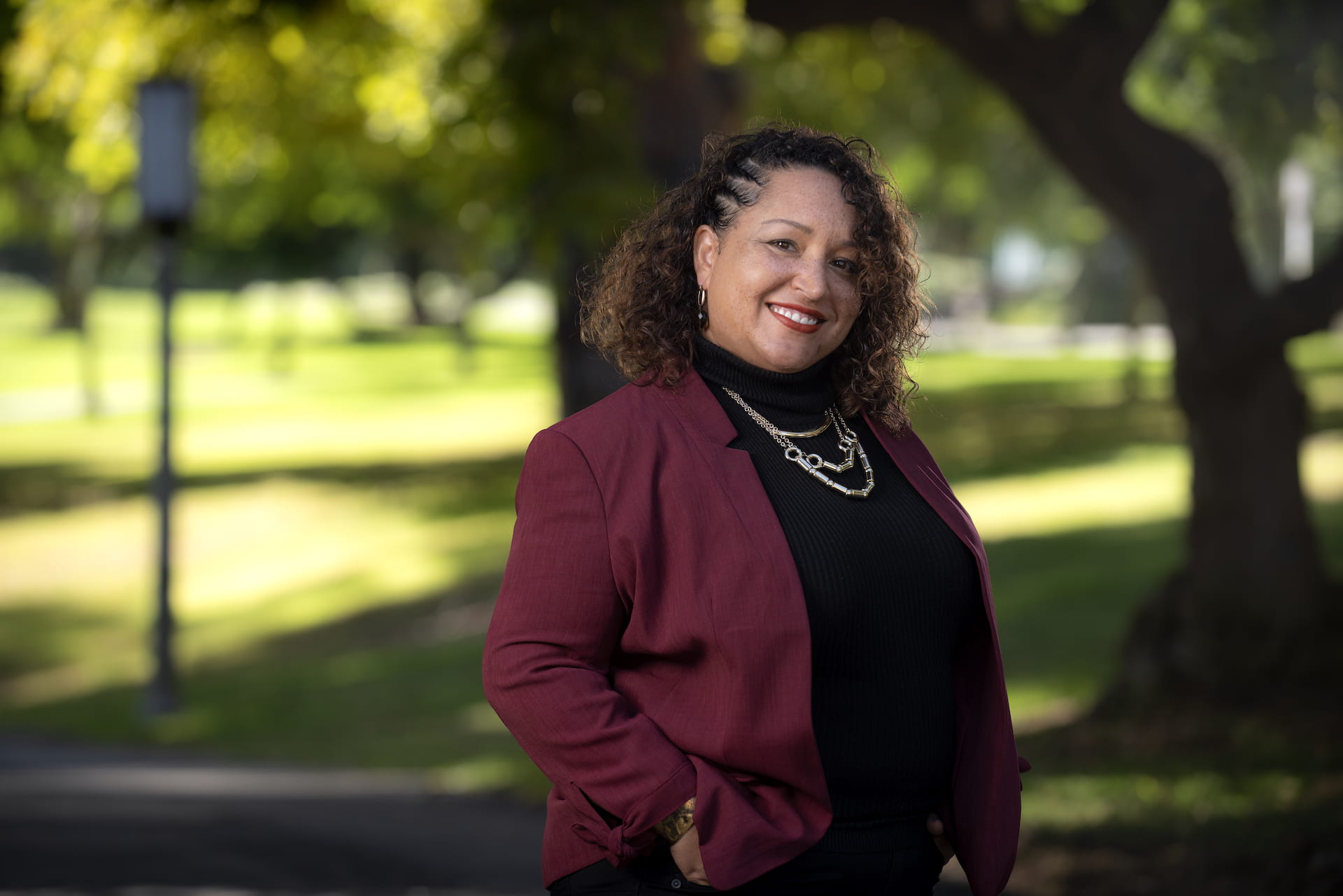UCI Podcast: Enrollment management's unique perspective
Enrollment management positions UCI as a future-ready campus that produces future-ready students

With a bird’s eye view of the UCI student body, enrollment management is in the unique position to see into the future. This ability to identify trends enables the division – which includes undergraduate admissions, financial aid and scholarships, registrar, and enrollment management analytics – to engage with campus partners and create the environment that best meets the needs of our students and advances the campus’ mission. In this episode of the UCI Podcast, Associate Vice Chancellor for Enrollment Management Patty Morales breaks down just how her division helps to position UCI as a future ready campus that produces future ready students.
In this episode:
Patty Morales, associate vice chancellor for enrollment management
To get the latest episodes of the UCI Podcast delivered automatically, subscribe at:
Apple Podcasts – Google Podcasts – Stitcher – Spotify
Transcript
(00:09)
From the university of California, Irvine, I’m Sheri Ledbetter, and you’re listening to the UCI Podcast. Today I’m speaking with Patty Morales, associate vice chancellor for enrollment management at UCI, about the important role enrollment management plays in the university’s strategic mission and goals. Patty, thank you for joining me today.
Thank you for having me.
Let’s just start with the basics. What is enrollment management?
Enrollment management is about ensuring that our enrollment, the campus enrollment reflects the mission and goals of the university. So for instance, we supply intelligence information, but also partnership. We are a source of coordination for the campus. And we’re always sort of keeping watch to make sure that the students are reflective of who we are as a university and what we want to achieve.
So, what are the areas that enrollment management covers in terms of the areas within the university?
(01:15)
Yeah, so we really have both an external and an internal facing role. The external is some student services, such as financial aid and scholarships, university registrar and undergraduate admissions. And then internally we serve our partners, other colleagues on campus with data, analysis, and coordination. As I mentioned earlier, we have a unique perspective of seeing very broadly what each office brings and how they’re impacted by enrollment and we’re there to guide them and stay ahead of what they might need to know to provide the best experience to students.
That was helpful. You mentioned access to data among other things, and I’d like to know how does enrollment management guide the campus in terms of the strategic goals that you talked about?
Okay. I would like to give an example about the great diversity of educational experience our students have and highlight one aspect in particular that I don’t think folks consider very often.
(02:31)
And that’s the diversity in educational preparation, and I’m not necessarily me that students are coming in without enough of it. Just that there’s a great deal of difference out there. Students are from all parts of not only this country, but in this state, and obviously the world. And they’ve all been exposed to different curricular requirements. And when they come to UCI, we’ve selected them because we know that what they’ve experienced is something we value and something that we want to contribute to this campus. However, we also need to be prepared to support that. So our data and our analysis, we’re able to partner with colleagues and let them know here’s what you need to understand about our students. Here’s what you need to understand about how they’re being taught math, for example, which is very different today than it might’ve been 15 or 20 years ago.
(03:33)
Do faculty know that? Some do. Some may not fully understand what that could mean. And we’re here to ensure that the student support programming, wraparound services as we often call them, and the faculty themselves and academic advisors know this information so they can adapt, because I believe they do want to understand their students well. And that’s in the data actually. So we’re turning these data points into not just information but impact.
So it sounds like enrollment management is really at the forefront of any kind of student trends. So how would you use some of this knowledge that you’re getting ahead of the rest of the campus? How would you sort of share it or partner with another partner on campus to create something that is helpful to this new trend of students or something like that?
(04:33)
I do understand, I think there are several overriding objectives that most all of us who, whether on the administrative or academic side, have in common. Student success being of course, one of them and optimal student experience being another. Since our role in enrollment management is being ahead of what’s around the corner. Being able to help our colleagues anticipate through just what we know externally about students, what we’re seeing in the data, we know that they care about those themes. So, we’re trying to deliver, for example, consultative services in a way where we’re leveraging our own data analytic resources, which are rich, as I’ve mentioned a moment ago, to engage with academic advisors. For example, I’ll take that as an example and lead them into some of the reports that we’re able to develop and get very specific about insights that they would care about.
(05:46)
For example, certain courses that end up being bottleneck courses that end up being barriers to the student, sort of advancing through their major because it ends up looking like there’s a problem with retention and we think, oh, maybe there’s a problem with the students’ academic success. But in actuality, it’s a problem with access to the course itself because maybe there aren’t enough sections. And this is something that we’re able to talk about with our campus partners. It’s not just us telling them, here’s what you need to know. We need to hear back from them. Okay. Where do you see that students are struggling? And let’s see if we match that up with the data and if they seem different, why? We can initiate the conversation because of that goal that we share in common. But the ongoing engagement is really where the real impact is, is felt. And that’s why it’s an ongoing relationship. It’s not just, you know, give them a report and go.
(06:42)
Right. You explained that really well. I sort of have in my mind, this sort of fluid flow of data that you’re sort of reacting to, I don’t know if it’s a cyclical basis kind of an annual basis. And, even though you’re kind of like the first to see it, but you’re still kind of reacting to say, how can we use this for student success? Am I understanding that correctly?
You are, and it is cyclical. And it’s also in the moment. There are times in the enrollment cycle where day-to-day data changes are important to know. So in that example, I just shared about bottleneck courses and can students access it. We can literally see right down in the student level, how many times a student attempts to enroll in a course and how many attempts there are just sort of generally, what does that tell us?
(07:40)
It tells us if there’s students going in and trying and trying and trying, and it’s just, it’s already been filled, but they’re trying again, to see if a student left the course, or decided not to enroll in it after all. And now there’s a space. It tells us something about the interest in the course. And then we can sort of look at that over another quarter, over a trend from the previous year, see if there’s anything different, but that’s day to day data change that matters. On the other end of that are our five-year trends. You know, three to five-year trends when we’re looking at the demographic profile of our applicant pool, how are students who are on financial aid? What is their need generally? Is it increasing? Is it decreasing? Are there certain pockets where we see greater need than others?
(08:37)
Who are those students? What’s the best way to provide them the resources to be successful. And then we share that information with folks like student affairs, for example, who help with various other student support services, like fresh hub, and we help them understand, okay, we’re seeing a greater number of students with the greatest need more than might’ve been here three years ago. Let’s be prepared for that. I’m not saying that’s absolutely the case, just an example of why we would use trend data and then other ones where we would use daily changes in the data.
Wow, that’s a lot of data.
That’s a lot of data and I want to be cautious that I don’t want it to seem as though enrollment management is only about data. It’s about how we’re using it to guide our campus partners, to guide the campus itself, really, to provide intelligence we can see beyond those corners and we can help the institution just be responsive to that and be able to make opportunities from it, I think is probably the most important facet. Is that part of making opportunity out of what we’re seeing coming up.
(09:50)
It sounds like you really have access to sort of this macro picture and also simultaneously a micro picture. So that’s really a lot of toggling a little bit back and forth on working with our campus partners with resources and steering the university more toward student success, not only helping the students, but creating a stronger university.
Yes. And I’m glad that you’ve mentioned a stronger university because I want to just touch on a theme that’s very important to me and my vision for enrollment management here. And that’s about what – a moment ago I was talking about what students are bringing to us. Why do we value diversity at UCI? Why do we feel that inclusion is essential to excellence?
(10:49)
Because those students are bringing something to us that make us better. We’re able to be adaptive. We’re able to be nimble. We’re able to be relevant and in a 21st century future ready way that some other universities that are 200 years old or more may not be as sensitive to, to be candid. I think that we’re really well-prepared to expand our understanding of the perspectives and what they contribute to our mission. And they challenge us and they change us. And it’s reciprocal. The students are helping us learn and grow. We’re not just bestowing upon them education. We are doing that, but it is mutual. They’re bringing something to us too. I really want students to know that. And when I do have an opportunity to engage directly with students, I’m really intentional about driving that point.
(12:04)
I don’t want them to feel that they’re just here to be receptacles for what we have to offer. It goes both ways. And I think that’s why we are a model for inclusive excellence in this country.
I’m really glad you made that point because I don’t think that’s widely known. I think it really is a situation where it’s this, you know, there’s a gift, there’s a giver and there’s a taker, but it really, it’s mutual going both ways. And it just makes for a richer experience all around. So thank you for, for taking a moment to emphasize that what are, what are some of the opportunities for enrollment management?
You know, it, it’s a really exciting time to be a leader on this campus because there are so many opportunities. We are a minority thriving institution, as I was talking about earlier.
(12:53)
And one that I feel is positioned to create a future ready campus that produces future ready students. There’s so much opportunity in that to partner with other offices and other colleagues across campus to help advance their respective goals as well. And we become greater than the sum of our parts. I’ll give an example. We are a Hispanic serving Asian American Native American Pacific Islander serving institution. And within those designations are opportunities to apply for grants. And with, because of those grants, we’re able to really explore ideas. We’re able to conduct additional research, have our students invited into that research, really challenge ourselves to say, okay, what does it mean to have that designation? What does it mean to have that designation as a leading global research institution? What is our responsibility to that? Lots of opportunities get created there. We are excited on the enrollment management side because we have all of those pieces.
(14:02)
We have all those facets, we have the data and we have the intelligence and the insights. So we can bring that to our colleagues, for example, in the office of research, in the office of inclusive excellence and the office of the Dean of undergraduate education, in student life and leadership there’s so much that we can do with where UCI is positioned right now as a young, nimble institution.
So, we can really hone in on what are the needs of our students now, and what we see are sort of the coming needs, like in some of the places you talked about in research grant applications and some of those things in student life. That that makes perfect sense in terms of opportunities. Thank you. I’d like to ask you what is your vision for enrollment management and also for universities that use enrollment management?
(14:57)
My vision at UCI is that concept of being, making us a future ready campus and helping our students to be future ready as well. And this goes back to an earlier theme I was talking about in terms of reciprocity and what the students are bringing to us and why we feel it is so important to have a diverse campus. It’s not just for the sake of having a diverse campus. It is because we understand that that diversity of experience challenges us, makes us better, brings more into our universe. We become richer. We become, we have to be responsive. We have to be more curious to understand that, and in doing so and having that reciprocity, we’re helping each other sort of anticipate what’s next. To say more about that, I’m going to offer this example. I’m especially excited about this because it’s been a new initiative
(15:59)
that’s only about a year and a half old in terms of enrollment management coming into this initiative that was born about four years ago, out of the office of the Dean of undergraduate education. Vice provost of teaching and learning, Michael Dennin, started an initiative called compass, which stands for comprehensive analytics for student success. And that office was partnering with the office of information technology, office of institutional research, our academic advisors, and they were bringing together data to try to find ways to best support students, to understand again, who they are and what they might need. Where enrollment management comes in – it’s in the last year and a half, I’ve put together a real vision for enrollment management that as I’ve been talking about incorporates data in a very impactful way. I formulated an office of analytics – enrollment management analytics. And inenrollment management analytics
(17:05)
we’ve built a, just extremely robust and rich set of resources about our students. The data that we get from applications, from the registrar, course taking patterns, all of that information, we’ve been able to put into an extremely comprehensive and robust set of reports. And we’ve now partnered with DUE, division of undergraduate education and, our other colleagues who started the compass project to bring all of this data together. And then also the Dean of the graduate division, Gillian Hayes, her area as well. We’re adding on graduate data to have all of us under this compass umbrella. What’s very unique about the way UCI is approaching this initiative and where enrollment management is a crucial partner in this endeavor is that collaborative effort. We each have these offices of information technology, institutional research, undergraduate education, enrollment management, and graduate division.
(18:18)
We each have our piece of the, of the pie, right? A piece of the puzzle, I should say. We’re bringing this all together. And we’re seeing all kinds of ways. It’s generating so many opportunities. We were talking about opportunities before. I’ll give you an example. Graduate division is always looking at ways of building their enrollment pipeline for diverse graduate enrollment. And we’re looking at our undergraduate students and the courses of study they’re following and seeing if there are grant opportunities that might be afforded by our status and as a minority thriving institution, to see if we could find interesting recruitment or pipeline development programs that maybe we get the funding from a grant, we’re able to identify a population of students that graduate division would love to see, and be able to take advantage of one of their programs. We’re able to get the data that we need to identify those students, to track their success, to find out are there resources that they’re going to need?
(19:30)
And this is just an example of how various offices can come together. And this is an audacious project. It’s very exciting. And it’s one of the projects that I think is really distinguishing UCI from other institutions that also do enrollment management.
And that’s just one, I mean, I really feel like we could talk for a much longer period of time than we have here today on even other opportunities out there based on the access to all the data that you have. That’s a great example. Thanks for sharing it.
(20:31)
This goes back to the earlier point about reciprocity, how our students are bringing us so much, they are challenging us. They are making us, they are requiring us to be responsive and to understand what we might not have been thinking about before. If we haven’t had such a broad array of students from such diverse backgrounds, we may have been missing some very important perspectives. When we have those students, helping our faculty, helping our staff, helping one another learn about those perspectives, we’re making them more future ready. We’re helping them go into whether it’s graduate, study, the workforce, their communities, to feel very proud of what that means to have understanding of the value that that has created not only for themselves, but that they could see it directly reflected in the university. So that makes us especially prominent, I think relevant, I should say for modeling 21st century, what of 21st century university should be, and should be doing. There are institutions that are hundreds of years old and, and they are established in their traditions and in their identities.
(22:02)
And sure they might be trying to adapt those a bit. And that’s to the question of enrollment management and other places. And what some of my colleagues at other institutions might be focused on is how do they keep this identity? That’s been around an institution for 200 years and, you know, helping to adapt it. We’re in a very different place, we’re positioned to be nimble. We’re positioned to be responsive to really hear what our students are bringing to us and think about ways to leverage that. And that’s exciting, that makes it exciting to be a leader here that makes it exciting to be among our students here.
Yeah. I love that: “future ready.” It makes me think of we’re a ship or we’re on a ship full of students and our ship is always pointed toward the future. And enrollment management is sort of the linchpin that keeps us on the path.
Let’s end this on a fun question to help us learn a little bit more about you. I have heard throughout this, just the joy in your voice and in your answers, but I’d love to hear, what do you enjoy about your job? Is there something you really get a kick out of?
What I love most is being able to partner with so many colleagues around campus. I do love that I get to have a coordination role. I really value that. I’ve always valued that in my career, understanding what other offices do, how they serve students, I find very interesting, and I’m always trying to find the points of intersection. Not only what enrollment management can do in partnering with that office, but other offices. In enrollment management we have to understand what all the different administrative units on campus do so that we can be ready to anticipate their needs.
(24:18)
I love that. Finding that out. That’s the funnest. Is that a word? That’s the most fun thing for me, but then I also love because since I was talking so much about data, I’d love the detective work that I get to do and diving into all of that and seeing are there patterns here, the discovery that happens sometimes, and when you find something that is a pattern or an insight, you get so excited about it, and then you just want to go run to another colleague and say, what can we do with this? So I’m glad you asked that question. That’s why I love what I do.
I’ve heard you talk about in other settings about likening enrollment management to sort of art, right?
Yes. Sure. I think of it some ways that I try to make a metaphor for folks, if I’m describing what I do and in simplest terms would be like an impressionist painting.
(25:13)
If you stand close to an impressionist painting, you see a lot of colors that sort of interact with one another, but you can’t really quite tell what it’s representing. It’s just groups of colors. And as you step back more starts to come into focus. You start to see shapes form, but really it’s when you’re several feet back that then you see the entirety of the picture. And sometimes if you take even a further step back, you see the light in it, you see the movement in it, a painting that’s 200 and more years old can feel alive. And so why I think that that’s like enrollment management is we are those colors that are, we have all of that. That’s in the data. It’s all those colors coming together. But enrollment management also brings us back, brings the campus 3, 4, 5 steps back so that we can see a big picture. And then again, that we could see the life in it and the potential and where we are part of that experience as well. So that’s where that analogy comes from.
I love that. That makes perfect sense to me and anyone who’s ever looked at a painting, I think can totally relate to that. And I think that’s just a great way to end this. So thank you so much. Associate Vice Chancellor Morales. Thank you for speaking with me today.
Thank you for having me. This has been fun.
(26:47)
For more information, you can visit UCI’s enrollment management website at enrollment dot uci dot edu. The UCI podcast is a production of strategic communications and public affairs at the University of California, Irvine I’m Sheri Ledbetter. Thank you for listening.






